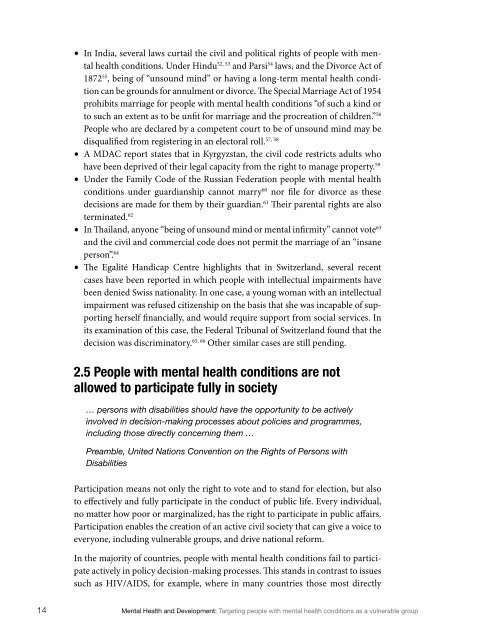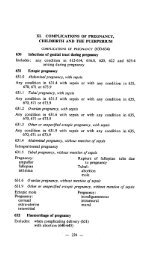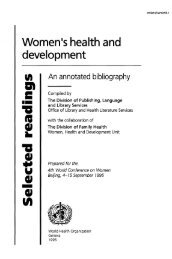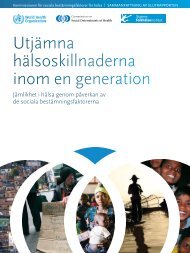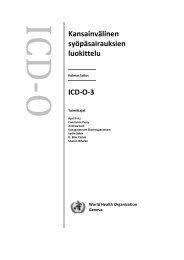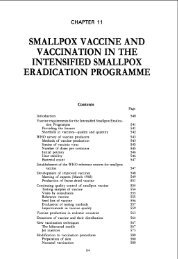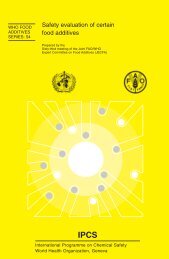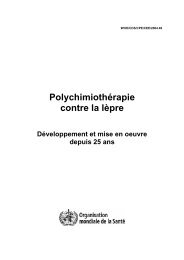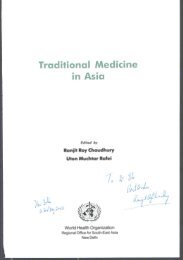MENTAL HEALTH AND DEVELOPMENT: - libdoc.who.int - World ...
MENTAL HEALTH AND DEVELOPMENT: - libdoc.who.int - World ...
MENTAL HEALTH AND DEVELOPMENT: - libdoc.who.int - World ...
You also want an ePaper? Increase the reach of your titles
YUMPU automatically turns print PDFs into web optimized ePapers that Google loves.
• In India, several laws curtail the civil and political rights of people with mental<br />
health conditions. Under Hindu 52, 53 and Parsi 54 laws, and the Divorce Act of<br />
1872 55 , being of “unsound mind” or having a long-term mental health condition<br />
can be grounds for annulment or divorce. The Special Marriage Act of 1954<br />
prohibits marriage for people with mental health conditions “of such a kind or<br />
to such an extent as to be unfit for marriage and the procreation of children.” 56<br />
People <strong>who</strong> are declared by a competent court to be of unsound mind may be<br />
57, 58<br />
disqualified from registering in an electoral roll.<br />
• A MDAC report states that in Kyrgyzstan, the civil code restricts adults <strong>who</strong><br />
have been deprived of their legal capacity from the right to manage property. 59<br />
• Under the Family Code of the Russian Federation people with mental health<br />
conditions under guardianship cannot marry60 nor file for divorce as these<br />
decisions are made for them by their guardian. 61 Their parental rights are also<br />
terminated. 62<br />
• In Thailand, anyone “being of unsound mind or mental infirmity” cannot vote63 and the civil and commercial code does not permit the marriage of an “insane<br />
person”. 64<br />
• The Egalité Handicap Centre highlights that in Switzerland, several recent<br />
cases have been reported in which people with <strong>int</strong>ellectual impairments have<br />
been denied Swiss nationality. In one case, a young woman with an <strong>int</strong>ellectual<br />
impairment was refused citizenship on the basis that she was incapable of supporting<br />
herself financially, and would require support from social services. In<br />
its examination of this case, the Federal Tribunal of Switzerland found that the<br />
decision was discriminatory. 65, 66 Other similar cases are still pending.<br />
2.5 People with mental health conditions are not<br />
allowed to participate fully in society<br />
… persons with disabilities should have the opportunity to be actively<br />
involved in decision-making processes about policies and programmes,<br />
including those directly concerning them …<br />
Preamble, United Nations Convention on the Rights of Persons with<br />
Disabilities<br />
Participation means not only the right to vote and to stand for election, but also<br />
to effectively and fully participate in the conduct of public life. Every individual,<br />
no matter how poor or marginalized, has the right to participate in public affairs.<br />
Participation enables the creation of an active civil society that can give a voice to<br />
everyone, including vulnerable groups, and drive national reform.<br />
In the majority of countries, people with mental health conditions fail to participate<br />
actively in policy decision-making processes. This stands in contrast to issues<br />
such as HIV/AIDS, for example, where in many countries those most directly<br />
14 MentalHealthandDevelopment:Targetingpeoplewithmentalhealthconditionsasavulnerablegroup


